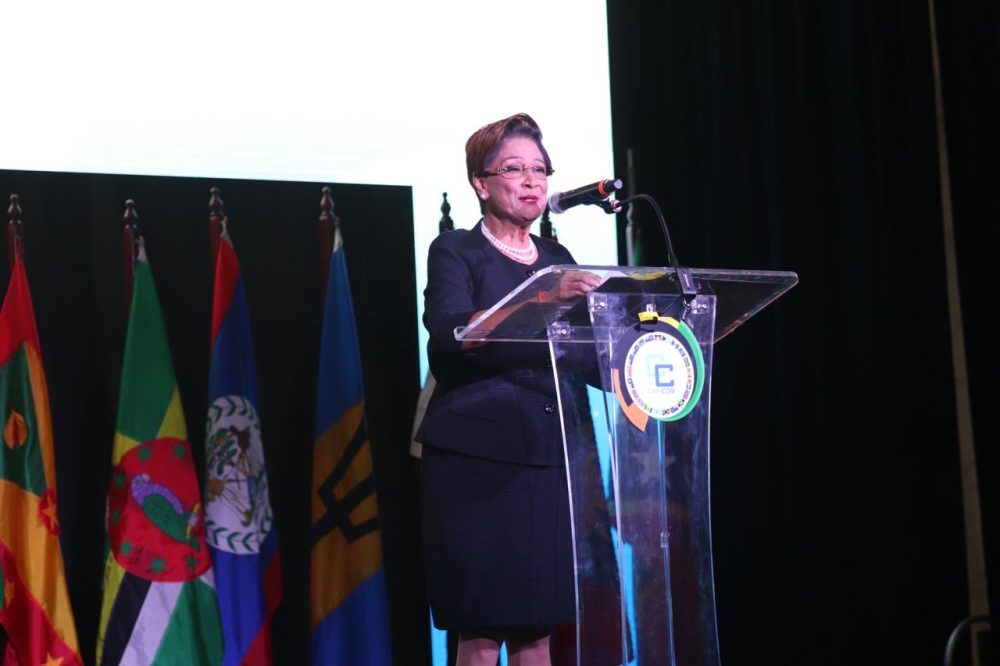
CARICOM – Young agriculture entrepreneurs (agripreneurs) from across the Caribbean Community (CARICOM) were involved in sessions with senior agricultural planners earlier this month geared at strengthening regional policies and strategies to improve the performance of the Region’s agriculture sector.
The youths were among participants of the Ninth Regional Planners Forum on Agriculture in Trinidad and Tobago. The forum was coordinated by the CARICOM Secretariat and the Inter-American Institute for Co-operation on Agriculture (IICA), and included inter alia participants from the agricultural agencies in the Region – the United Nations Food and Agricultural Organisation (FAO), the Caribbean Agricultural Research and Development Institute (CARDI), The Caribbean Farmers Network (CAFAN), the Caribbean Agribusiness Association (CABA) and the University of the West Indies .
The Forum , which began on 7 June, attracted more than 45 participants. The 25 young agripreneurs participated in the first day of the meeting and underwent a three-day training programme specifically tailored to increase their skills in business. The training was conducted under the CARICOM Secretariat’s Creativity for Employment and Business Opportunity (CEBO) Training Programme.
The integrated event was funded by the European Union (EU) under the 10th European Development Fund project ‘Caribbean Action under the Programme entitled Agriculture Policy Programme (APP) with focus on the Caribbean and Pacific’. It was coordinated by the CARICOM Secretariat as implementing partner of Component 1 of the project, ‘Strengthening Regional Agricultural Development Strategy’, and IICA, the implementing agency of the APP.
The opening session of the forum was chaired by Mr. Nigel Durrant of the CARICOM Secretariat. Addresses were made by Senator, the Hon. Clarence Rambharrat, Minister of Agriculture, Land and Fisheries of Trinidad and Tobago, Mr. Gregg Rawlins, IICA Representative in Trinidad and Tobago, Mr. Ulrich Thiessen, Programme Officer of the EU Delegation to Trinidad and Tobago, Mr. Barton Clark, Executive Director of CARDI and Chair of the CARCOM Agriculture Food and Nutrition Cluster, and Ms. Desiree Field-Ridley, Adviser Single Market and Sectoral Programmes, CARICOM Secretariat.
Agriculture is hard work
In his feature address, Minister Rambharrat underscored the critical role of planners in leading the policy direction in agriculture through engagement that incorporated the realities of the sector, the concerns of the stakeholders, long-term rather than only short-term outputs, and the administrative/legislative environment in which the sector must operate.
Minister Rambharrat conceded that agriculture was hard work with many challenges especially for young producers who are mainly landless, without capital and unable to achieve economies of scale from their small back yard operations. He stressed that improved coordination and continuous exchange of information were critical to address declining food production in the Region.
In this regard, he emphasised that plans could not be prepared or effected in the absence of collaboration with other key ministries which had jurisdictions over specific requirements of the agricultural sector; land, water, capital, trade.
The Minister also brought to the attention of planners, his concern over the loss of specialists in the sector. He pointed out that officials who joined the Ministries as specialists generally moved into administrative positions over time, thereby leaving gaps that were not being filled in a timely manner through succession planning. The Minister assured the meeting of the support of the Government of Trinidad and Tobago, his Ministry and himself in ensuring that the capacity-building of planning divisions was taken seriously for the high performance needed to lead policy direction.
Mr. Thiessen of the EU Delegation to Trinidad and Tobago assured the meeting of the EU’s very strong support for CARICOM. He referred to the Economic Partnership Agreement (EPA), signed in 2008 which acknowledged the two regions’ different stages of development and provided 100% duty- and quota-free preferential access to the EU for all goods and services whereas Caribbean States have up to 25 years to cut import tariffs. In addition, the Caribbean States had the right to respond should EU imports suddenly threaten local production and have additional protection on sensitive goods. The EPA also supported the Region’s integration process and a recent Caribbean regional programme, for the period 2014-2020, valued at 346 million Euros, would support three focal areas; regional economic cooperation and integration, climate change, environment, disaster management and sustainable energy, and crime and security, he said.
Mr. Thiessen underlined the value of the meeting in light of the relative difficult economic situation in several CARICOM countries. Considering the Region’s large food import bill, the EU was convinced that agriculture could indeed become a significant foreign exchange saver and be intrinsically linked to the tourism sector. He said he looked forward to the sector’s development in the coming years with positive results on economic diversification, development, exports and employment.
CARICOM Secretariat leadership role
Extending greetings on behalf of IICA, Mr. Rawlins applauded the leadership role of the CARICOM Secretariat in supporting national and Regional agricultural policy. He pledged his agency’s support to the delivery of the APP in close collaboration with the implementing partners, CARICOM Secretariat and CARDI. Recognising that Component 1 of the APP has supported coordination and collaboration of the Region’s agricultural stakeholders, he urged planners to develop a more dynamic sector with sound and relevant policy and to review their roles and effectiveness in getting desired outcomes. Mr. Rawlins particularly welcomed the CEBO initiative in light of the increasing unemployment levels in the Region. He provided the example of unemployment of youth in Trinidad and Tobago which was assessed at 46.9 per cent.
Mr. Clarke told planners that the future was their hands. Production and trade, he said, took place in the Member States, and Regional agencies such as CARDI rendered assistance as needed. He urged planners to become conversant with obligations that their countries had made at international fora and to the CARICOM Strategic Plan when framing their national policies. He provided a number of considerations that the CARICOM Agriculture Food and Nutrition Cluster had identified as key to the advancement of Regional agriculture. The considerations were articulated in a concept note to His Excellency David Granger, President of Guyana, in his capacity as CARICOM’s Lead Head of Government for Agriculture. These, inter alia, highlighted commitment to green agriculture, diversification and increasing the agricultural pillars, national and regional actions to priority commodities and values chain development, focus on youth and hinterland engagement, trade and investment, removal of Non-Tariff Measures and exploiting opportunities of communication via the social media.
Forum role
Ms. Field-Ridley underscored the role of the Forum in framing positions on agriculture for the Ministers of Agriculture.
The Regional Planners Forum provided for dialogue amongst Agricultural Planners of the Region and articulation of Regional policies in agriculture based on national and Regional priorities. The recommendations of the forum will be presented to Ministers of Agriculture at the Special Meeting of the Council of Trade and Economic Development (Agriculture) for that body’s consideration. The forum is therefore a key body to map the growth and expansion of the agricultural sector of CARICOM and realisation of the CARICOM Single Market and Economy (CSME).
Ms. Field-Ridley also stressed the importance of agriculture to the growth and development of Member States and the Region as reflected in the Community Strategic Plan to 2019. This would include the need to increase agriculture production and exports and address the high agriculture import bill with the resulting increase in incomes and employment. This therefore highlighted the important role of the planners and of the private sector and underscored that greater use should be made of our CSME arrangements to position agriculture.
She acknowledged the challenges youth in agriculture faced, and stated that a concerted effort was being made to engage them and build on their participation in the Planners Forum. The CARICOM Heads of Government, in the Declaration of Paramaribo on the Future of Youth in the Caribbean Community, noted their ‘resolve to generate entrepreneurial development among our youth from the earliest stages through education and mentorship, and the fostering of private and public sector partnerships that create an environment for business development and growth’.
She advised that the CEBO training being offered had the objective to engage, inspire and create entrepreneurial interest and action among young CARICOM nationals in and out of school and from all walks of life, as a means of countering youth unemployment and fostering economic resilience.
Taking the planners through the meeting’s programme, Ms. Field-Ridley anticipated firm recommendations at the final plenary on policy and planning approaches, youth policy for agriculture, actions to support national agricultural plans, commodity specific development needs, enterprise and industry business support and agri-business risk management.
Discover more from Discover Montserrat
Subscribe to get the latest posts sent to your email.



